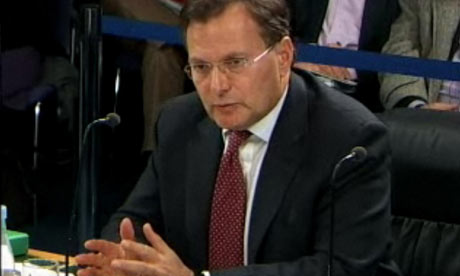Former attorney general urged to clear up the discrepancy between what he told the Butler review and what he told the Chilcot inquiry Former attorney general Lord Goldsmith gives evidence to the Chilcot Inquiry Photograph: PA Fresh questions have been raised about how Lord Goldsmith, the former attorney general, came to back the use of military force in Iraq after one of the UK's leading legal experts highlighted apparent contradictions in his testimonies before two official inquiries. Philippe Sands, professor of inter national law at University College London and director of the Centre for International Courts and Tribunals, said urgent questions needed to be asked about differences between Goldsmith's testimonies to the 2004 Butler review and the Chilcot inquiry. The discrepancies centre on the crucial days in the middle of March 2003 when Goldsmith moved decisively to back the legality of the war. His belief that the war was legal – a dramatic firming of his earlier position, which had been far more equivocal – has astonished legal experts. "Barristers and lawyers are entitled to change their minds and revise their views, and they frequently do," Sands said. "However, in 25 years as a member of the Bar I have never come across such a dramatic change in the absence of new or previously unknown facts, or the emergence of a new legal rule." Goldsmith communicated his decision to ministers and government officials on 13 March 2003, having met Tony Blair and defence chiefs two days earlier. Last month he told Chilcot that the first person with whom he discussed his view that the war was legal was the then foreign secretary, Jack Straw. According to Goldsmith's diary, the meeting took place at 6pm on 13 March 2003. Goldsmith told the inquiry: "I can't recall whether he had already got to know of my view, but in any event there was some discussion about that." The meeting with Straw was in advance of another meeting Goldsmith's diary records as having taken place with "Lord Falconer (then a Home Office minister) & Baroness Morgan (director of political and government relations at Downing Street) at 7.30pm". Yet, according to unreleased transcripts shared with the Observer, Goldsmith told the Butler inquiry – which examined the quality of the intelligence that Saddam had the capability to produce WMDs – a different story. Goldsmith said: "I conveyed that view [as to the legality of the war] in the first place in a meeting on 13 March with Morgan and Falconer, at which I informed them that I had formed the view … that it was lawful to use force without a further resolution." Sands questioned why the conversation with Straw was omitted from his testimony to Butler and inserted into that given to Chilcot. "A close reading of the transcripts of the evidence given to the Chilcot by Blair, Alastair Campbell, Peter Goldsmith and Jonathan Powell suggests some degree of coordination, yet between these accounts there appear to be some significant discrepancies," he said. Another discrepancy has already been noted by the Chilcot inquiry and close observers. Goldsmith was also asked by one of the Chilcot panel, Sir Roderic Lyne: "How was it decided that you would present the advice to cabinet in the way that you presented it to cabinet? Was it solely by you, or was it by you in discussion with the prime minister or the foreign secretary or others?" Goldsmith replied: "No, this was really my decision." When pressed by Lyne whether anyone "asked you to restrict what you said to cabinet to the fairly limited terms in which you presented this to cabinet?", Goldsmith said: "No." However, a note of the meeting between Straw and Goldsmith, taken shortly afterwards, states: "The attorney general said to the foreign secretary that he thought he might need to tell cabinet when it met on 17 March that the legal issues were finely balanced. The foreign secretary said that he needed to be aware of the problem of leaks from that cabinet. It would be better, surely, if the attorney general distributed the draft letter from the foreign secretary to the foreign affairs committee as the basic standard text of his position and then made a few comments. The attorney general agreed." "The note plainly indicates that Straw did ask the attorney general to restrict what he said to cabinet," Sands said. "Further evidence, including witness testimony, has confirmed that Goldsmith restricted what he said to cabinet: he did not indicate to cabinet his actual belief that the legal arguments were 'finely balanced'. It is this failure that has led to the claim that cabinet and parliament and the British public were misled." Sands said he hoped Straw would be questioned further on these events when he testifies for a second time tomorrow. He called on the government to declassify and publish in full the tape and transcript of Goldsmith's appearance before the Butler inquiry.
Monday, 8 February 2010
Posted by
Britannia Radio
at
19:17
![]()





















